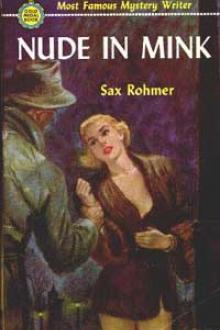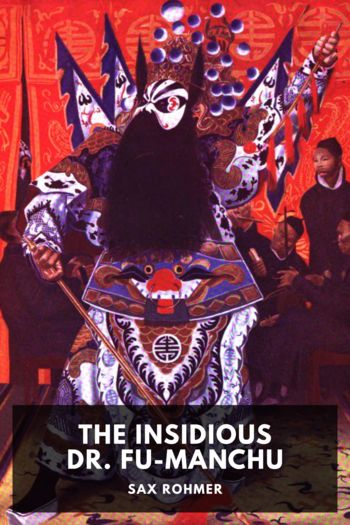Nude in Mink - Sax Rohmer (fun books to read for adults txt) 📗

- Author: Sax Rohmer
- Performer: -
Book online «Nude in Mink - Sax Rohmer (fun books to read for adults txt) 📗». Author Sax Rohmer
“Quite so! Describe her.”
“Very pretty, sir.” Harper rolled his eyes rapturously. “Smartly dressed. Uncommonly handsome—shoulders. Her frock was decollete, sir, so I couldn’t help noticing. Ahem.”
“But what was she like? Dark or fair? Tall or short?”
“I couldn’t swear to the exact colour of her hair, sir. She wore a sort of gold net over it. She was young—”
“How young?”
“I should have said in her early twenties. Sir Miles did not escort her to the door—which surprised me. She came down alone, and informed me that he did not wish to be disturbed.”
And then Steel Maitland asked what Donovan thought, at the time, to be a singular question.
“Did you notice her ankles?”
Harper’s expression was indescribably complicated.
“Her ankles, sir?”
“Exactly: her ankles.”
“Well—ahem—they were very well turned, if I may say so.”
“Did she wear a bangle on either, for instance?”
“A bangle on her ankle, sir? Not to the best of my recollection.”
“Oh. Had she a car waiting?”
“No, sir. I offered to obtain a taxi—if possible; but she declined.”
There was a momentary silence. The house, and the street outside, seemed to be unnaturally hushed. Donovan thought of that gross, immovable body slumped in the chair upstairs. He wondered what awful thing had reduced a massive frame to dead, but gruesomely solid, flesh, in so short a time…
When Chief Inspector Ives arrived, with others, the inspector stared hard at Steel Maitland and then shot out a large, muscular hand.
“Dr. Maitland! Why—this is like old times!”
“Glad to see you, Ives.” Mainland’s teeth glittered through his black beard.
He had been a divisional police surgeon before the war and had more than once solved problems strictly outside his professional province. This was a real reunion.
“Do you know the cause of death, Doctor?—or, let me see, isn’t it Commander now?”
“Plain ‘Doctor’ once more. Yes—I know what killed Sir Miles, and I propose to be present at the autopsy. When I have gone over the ground with you, Ives, I should be obliged for the loan of your car. My friend and I are—too tired to walk back …”
2
Caspar was crossing the marble floor, that eternal smile upon his thin lips. When he drew the tinkling curtains, the woman reclining upon the couch did not seem to have altered her position in any way. But her eyes were nearly closed, so that they glinted through heavy lashes with an effect of smouldering fire.
“Sister Dolores is here, My Lady.”
“Send her to me. What news of Claudette?”
“None, My Lady.”
“Has Sister Jean confessed the name of her friend?”
“Not yet, My Lady.”
“You know what to do. You may go.”
Caspar performed his profound obeisance, closed the curtains and glided away on whispering slippers. He drew aside the heavy drapery in an arched opening and called.
“Sister Dolores is wanted by Our Lady.”
And those other voices, beyond, took up the call.
“Sister Dolores…”
When the girl who was summoned, appeared, she proved to be a brilliant brunette, quite evidently Spanish. She wore an evening toilette which did full justice to perfectly moulded shoulders, and her dark hair was confined in a jewelled golden net. She carried a metal despatch box, and appeared to be intensely agitated.
Caspar having conducted her to the recess and retired, pent-up emotion overwhelmed the girl.
“Madonna!” she whispered—“Madonna!”
Sister Dolores had a fascinating accent.
“Kneel there, child, where I can see your eyes. You are trembling.”
From those golden tones the girl seemed to draw strength; but: “Oh, dear My Lady, it is—dreadful!” she said brokenly.
“What is dreadful, child? Did he die horribly?”
“No, no.”
“You replaced the snuff? You are sure that you spilled none when you emptied the box into your handbag?”
“None—no. He is out of the room. He has gone to bring his case of sapphires. I replace the—other stuff—in the box, and put the box back on his desk. When he returns… he takes some. And then—it is dreadful.”
“Explain what you mean.”
“His man comes in with a message! He hands this man the box and tell him to refill it! The man goes—and I am waiting—waiting—and watching the other one until the man returns!”
“Did this man notice anything?”
“No, Madonna, although, already—the other is quite still. When—it is finished, I have to leave the sapphire you give me to sell to him.”
“It is of no consequence. But why did you leave it?”
Dolores struggled to regain self-possession.
“His hand is clutching it—and I cannot move it! But I take his keys, as you order, and open the drawer in his desk. Here is the steel box. I carry it out under my cloak.”
She placed the metal box on an inlaid coffee-table beside the couch. She was still trembling violently—but listening for the music of that wonderful voice.
“You have done well, Dolores. But why are you trembling? It is better that one man—an ugly man, ugly in mind and body and soul—should die, than that our plans for a beautiful world should suffer. Here, in this box you bring, are details of our Order which only he possessed. Tonight, he meant to show them to someone else. I honoured you with the task of removing this danger. You have done well. Just think what the world might have been spared if one such as I had removed Adolf Hitler before his scheme to wreck civilization had come to pass. Look at me, Dolores. Your eyes are lovely behind their veil of tears. You have done well. Let me see you smile, child.”
“Yes … dear My Lady—”
3
“You are naturally anxious to know,” said Steel Maitland, lolling in the red armchair and lighting a cheroot, “what killed Sir Miles Tristram. Well, the answer is: he died of rigor Kubus—so called because its first recorded appearance was among the Kubus, a primitive tribe in Sumatra. It was described by the Dutch physician, Van Voorden, in 1923. He traced these cases to a secondary infection following the sting of a species of scorpion sometimes found in the neighbourhood. You noted (in fact, you turned quite pale) that Tristram’s body was like granite to the touch. Whatever is clutched in his hand we shall never be able to recover— except with a chisel. The jeweller’s glass is also immovable— and indeed they will have to bury him like a sitting idol.”
Donovan emptied his tumbler, and crossing to the buffet, refilled it.
“But—Sumatra! Tristram died right here in London!”
“I know—where I feared he would die. This thing operates like black magic, Donovan… and unless I am greatly mistaken, it is operated by a woman!”
“A woman!” Donovan stared incredulously. “You must mean a she-devil!”
“She-devil if you prefer it. No doubt you will ask: What is her object? I reply: Just what I am here to find out. One thing I know already. She is that most formidable of all creatures, a fanatic of genius. Her range of knowledge is stupendous, and exact. She never hesitates to employ it.”
“And in a sweet, gentle way!”
“You have witnessed merely one trivial incident; the removal of an obstacle. Women, as I have said, are her chief victims. In addition to Claudette, the daughter of Marcel Duquesne, why did Mrs. Orlington, the young wife of the Air Vice-Marshal, notify her husband that she had obtained permission to join him in Cyprus, and then fail to meet the plane by which she was to travel from England? Where did she go? What has become of her? Where is Claudette Duquesne?”
It suddenly occurred to Donovan that he was gaping like a village idiot.
“If I were to show you the list of missing women which has now been compiled, it would appall you. I don’t suggest that all have gone to her; but it is certain that a large proportion has.”
“White slave traffic on a major scale?”
“Yes—but with a different motive driving it. As for Sir Miles Tristram, although he was officially unrecognised, I may tell you in confidence that he was sometimes employed on intricate investigations. He had a uncanny flair for such work: they found that out when he was at Scotland Yard. Certain incidents in North Africa led to his being sent out there. I gave him all the information then in my possession, and he vanished into the blue. That was more than two years ago—just after I saw you in Cairo. It was an inquiry after his own heart. He reappeared in London and I came here to meet him. He had made many discoveries, and so had I. There’s a stout steel box in my baggage. Which contains all the evidence I have managed to accumulate to date. I dare not try to get it here tonight, but it’s safe enough where I left it. Together with Tristram’s discoveries it might have led us somewhere. Now—we shall never know what Tristram knew.”
“But, Maitland!” Donovan exclaimed—“who is this woman?”
Maitland shook his head.
“I confess myself to be on uncertain ground. She was the subject of an unfinished sonnet left by Romain Ravillac, the young French poet who jumped overboard from a liner two years after the war. In it, among other things, he refers to her hair as ‘clarte du soleil entrelacee,’ which I take to mean woven sunshine. On the other hand, a stolid Russian diplomat, who met her in Paris, speaks of her as dark, sombre, and also a ‘a deep, secret well.’ That she is a woman of unusual personal beauty seems to be established. In all other respects, accounts differ. But if you can imagine one possessing the arts of Circe and the allurements of Calypso, the brains of Winston Churchill and the soul of a Himmler, you will have formed a rough impression of the Marquise Sumuru.”
“Japanese?”
Again Steel Maitland shook his head.
“I have no idea of her nationality. But she is reputed amongst other things to be the widow of a Japanese marquis who committed hara-kiri, shortly after the first bombing of Tokyo. As Japanese aristocrats usually married in their own class, she may be Japanese.”
A score of questions, doubts, suspicions, flocked to Donovan’s mind; what he said—and he spoke in a hushed voice —was: “But rigor Kubus? What causes this frightful thing?”
Maitland took a sip of whisky.
“It is caused by the spores of a minute fungus. It invades the lymphatic membranes and multiplies incredibly. As it moves on, it first produces complete paralysis and then brings about a blood change which converts living tissue to something as hard as marble. A lot depends on the point of infection, and I actually had with me a vaccine (Van Voorden’s preparation) which, ordinarily, might have saved him. However—not only did I arrive too late, but nothing could have saved him.”
“Why?” Donovan stood by the buffet watching Maitland, a thin spiral of smoke coiling up from his cheroot.
“Infection can occur by swallowing the spores. In this case the onset of the awful symptoms is deferred—sometimes for hours. It can be injected. This method is swift. But Tristram had inhaled a tremendous shot of the stuff, and it went straight to the higher nerve centres. He probably lost consciousness a few minutes after Harper left him.”
“Inhaled it?”
“Of course. Surely that’s plain: Tristram, when absorbed, was curiously absent-minded. Someone (unseen by him) emptied the snuff from his box and replaced it by a or so heavily impregnated with the poison spores.”
“Why not merely have added the spores to what was already there?”
“Analysis would have discovered it. We are dealing with a lady who leaves nothing to chance. When he found the box to be empty, he





Comments (0)